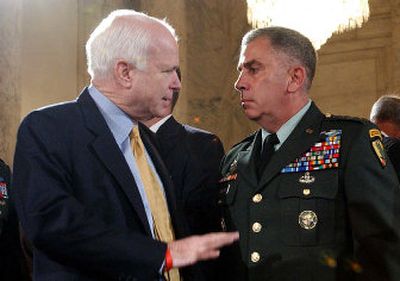Nervous Congress wavering on Iraq

WASHINGTON – The men responsible for winning the U.S. war in Iraq made their case before a nervous Congress Thursday, telling members of the Senate and House concerned about declining public support for the war that victory in Iraq was certain and that a U.S. military withdrawal would plunge the country into chaos.
Despite a sophisticated and effective insurgency that they said had not diminished in strength, Defense Secretary Donald Rumsfeld and three top military commanders painted a picture of steady progress in Iraq. And they warned skittish members of Congress that bowing to public pressure for a U.S. troop pullout could lead to a far more dangerous Iraq than the one that exists today.
“If the coalition were to leave before the Iraqi security forces are able to assume responsibility,” Rumsfeld told members of the Senate Armed Services Committee, “we would one day again have to confront another Iraqi regime, perhaps even more dangerous than the last.”
Yet during eight hours of testimony in both chambers of Congress, lawmakers from the North and South, and from Democratic as well as Republican constituencies, expressed their fears about declining public confidence in the progress of a war in which U.S. troops are still being killed on a near daily basis.
The appearance by Rumsfeld and top generals before Congress marked the opening of a push by the Bush administration over six days to shore up receding confidence in the government’s strategy and involvement in Iraq.
President Bush hosts Iraqi Prime Minister Ibrahim Jafari today and plans a major address Tuesday. Other administration officials are expected to weigh in on the issue in coming days.
Salvaging public support on Iraq has grown in importance for the administration as it encounters mounting opposition on several fronts, including to Bush’s chief domestic priority of overhauling Social Security and his most important nominations, such as that of John R. Bolton to be U.N. ambassador.
Rumsfeld and the generals told senators that despite a monthlong surge of deadly violence by militants, Iraq’s government and army were improving and the presence of the U.S.-led military coalition was still needed.
“Any who say we’ve lost this war or are losing this war are wrong,” Rumsfeld said, criticizing calls for troop withdrawals as a “lifeline to the terrorists.”
Rumsfeld and the generals responded bluntly to lawmakers, quickly countering criticism and sharply rebutting negative portrayals of the U.S. mission during the hearing of the Senate Armed Services Committee.
Sen. Edward M. Kennedy, D-Mass., said Iraq had become a “quagmire” with “no end in sight.”
“Well, that is quite a statement,” Rumsfeld responded. “There isn’t a person at this table who agrees with you that this is a quagmire.”
Generals appearing before the Senate said they understood the challenge they faced from the turn in U.S. public opinion. Army Gen. George W. Casey, the U.S. ground commander in Iraq, described the protracted conflict as a “battle of wills.”
“The insurgents are challenging ours,” Casey said.
Democratic and Republican members of the Senate Armed Services Committee agreed with military leaders that Iraqi politicians must meet an Aug. 15 deadline to draft a new constitution to advance political progress and to deny a propaganda victory to insurgents.
Sen. Carl Levin, D-Mich., the committee’s senior Democrat, said that while he opposed calls for withdrawal timetables, the administration should make clear that if Iraqis delay completion of the constitution, the United States would reconsider its options and “rethink our presence” in Iraq.
By insisting they meet the Aug. 15 deadline, Levin said the administration would send an “explicit message” that Iraqis must make the political compromises necessary to advance the government or face stern consequences.
Under questioning by senators, generals said that the number of attacks launched by insurgents have not declined appreciably in a year. While the makeup of insurgent forces is shifting to a greater proportion of non-Iraqi fighters, said Gen. John P. Abizaid, chief of the U.S. Central Command, the overall strength of the insurgency is the same as it was six months ago.
Abizaid refused to answer a question from Levin about whether he disagreed with Vice President Dick Cheney’s statement this month that the insurgency is in its “last throes.”
“I gave you my opinion of where we are,” Abizaid said.